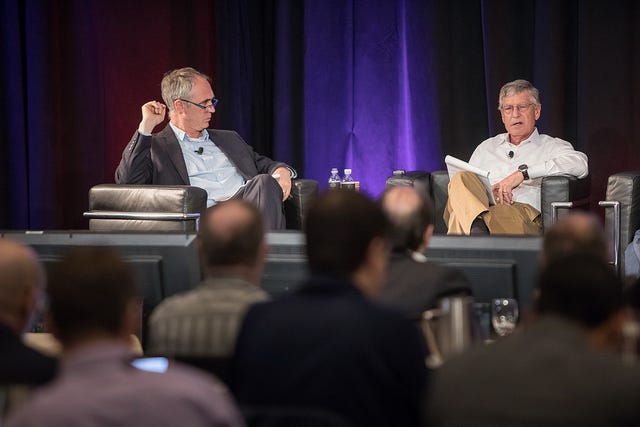FiRe 2017: Acquihires, Internal Culture, and Activism: What Happened at Yahoo

By Arunabh Satpathy
Bringing in up-close and personal view of the goings on inside Yahoo, ex-CFO Ken Goldman and current President of Hillspire told the audience about the kaleidoscope of reasons for Yahoo’s misfortunes, while being hosted by Ed Butler, Presenter and Senior Broadcast Journalist, BBC.
Drawing on his 40-year long career as a person in the financial field and as a CFO, he praised ex-CEO Marissa Mayer and how she was respected within the company because of her engineering background, unlike the previous 5 CEO’s. However, Goldman also lamented several issues that led to Yahoo’s current condition, like external activism and internal culture.
“The reality is that the culture was really tough,” he said. “It wasn’t conducive to what was going on in the [Silicon] Valley.”
As an example, he said that employees didn’t have smartphones within the company and said that Yahoo had a “non-internet culture.”
Another issue he mentioned was difficulties in hiring, because people wouldn’t want to join the beleaguered company. He said that the mobile engineering group only had 25 people in it. Goldman said that the company tried to “acquihire” employees, which led to a number of good people coming on the company.
However, the acquisitions came with their own set of difficulties. While saying that most acquisitions were successful, he pointed to Tumblr as a notable failure, calling it “challenging.” He drew attention to the nature of the content on Tumblr, which proved difficult to monetize.

Butler bought up the inevitable topic of the Yahoo hack, to which Goldman replied that while lawsuits are inevitable with large companies, he was “cordoned off” as the issue was mainly a cyber security issue. When quizzed on whether the hack affected morale, he disagreed, saying that the lack of morale came more from the uncertain future of the company regarding its business failures.
On the issue of activism, Goldman was critical of certain types of activists. He said that while some activists are constructive, some focus too much on firing the CEO, cutting costs, and selling the company. He said that the activism also harms companies at a business level, pointing out that public companies have two classes of stock because they don’t want to deal with activists. He also mentioned that said activism is the biggest reason fewer companies are going private or are choosing to stay private.
In reflecting on past mistakes, Goldman said that public and investor relations could have been better handled.
“We let the storyline be told by others,” he said.